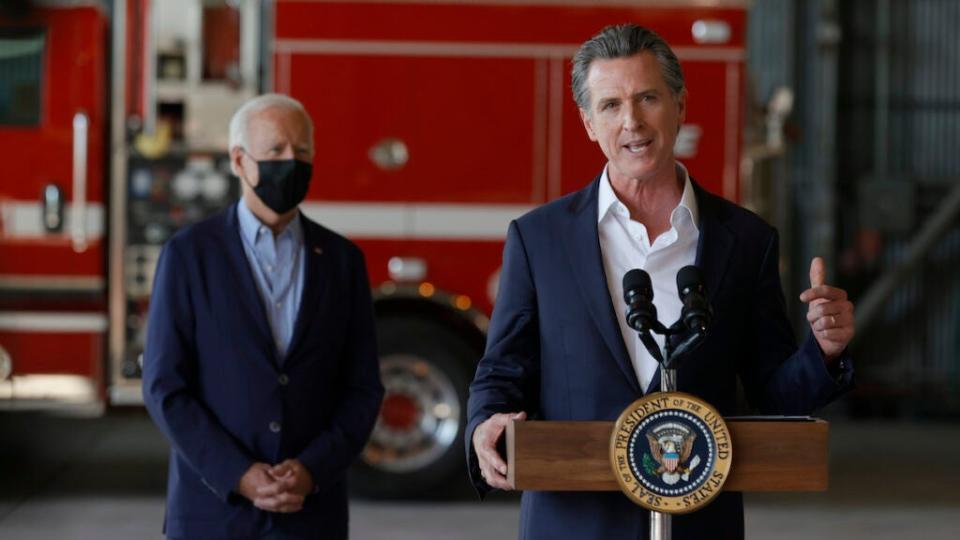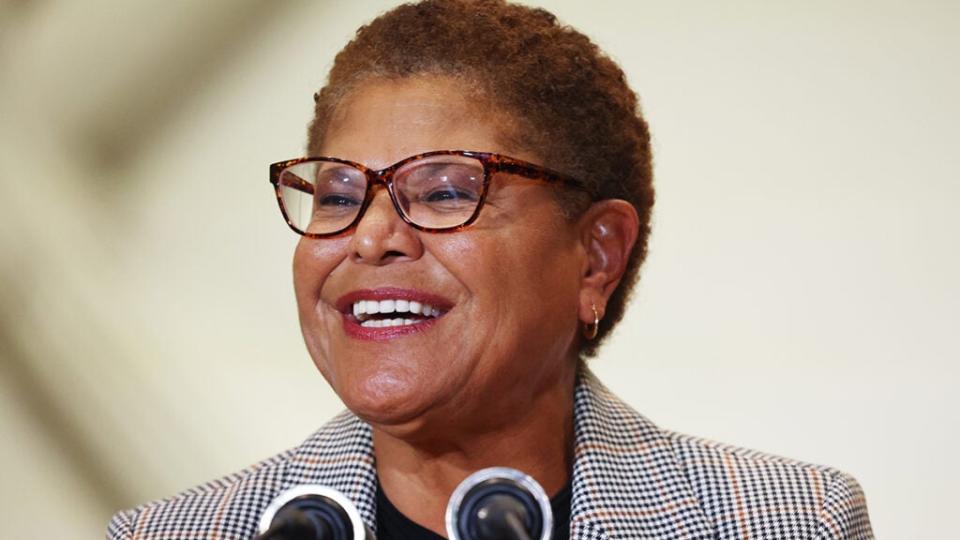California Film Production Tax Credits Face Uncertain Future
- Oops!Something went wrong.Please try again later.
This year’s budget proposals have California legislators again debating whether to keep giving money to filmmakers to keep their productions in the Golden State.
At a time when California is facing a $31.5 billion budget deficit, it’s hard for some taxpayers and lawmakers to justify giving stacks of cash to movie studios and production companies. Compounding the issue, some economists believe the incentives are a waste of tax dollars.
Under Newsom’s proposed budget, the tax credits, which expire in 2025, would be extended for another five years, at a cost of about $330 million per year. Newsom also has proposed that the program should make the credits refundable, which would effectively provide cash to film companies that have no tax liability in California.
Also Read:
All LA Production Is in Decline – But Commercial Production Is Especially in Danger | Chart
Unclear benefits
Michael Thom, a professor at the USC Price School of Public Policy, has extensively studied the economic benefits of such incentive programs, and found that the credits offer little return.
In a 2018 California Journal of Politics and Policy report titled “Time to Yell Cut?,” Thom found that, on average, the only benefits were short-term wage gains, mostly to people who already work in the entertainment industry.
“Job growth was almost nonexistent. Market share and industry output didn’t budge,” he noted in the report.
Thom told TheWrap that additional peer-reviewed studies in recent years have only strengthened his conclusions.
“There is no benefit to extending the tax incentive,” Thom said. “It drains money from the treasury — something California cannot afford with an enormous budget deficit.”
Also Read:
How Will a Writers’ Strike Reshape TV? | Analysis
Economists in Sacramento have expressed similar concerns.
“Our review of research on state film tax credits suggests that states with film tax credits have larger motion picture industries. Whether or not this results in growth of the state’s overall economy, however, is unclear,” the California Legislative Analyst’s office reported. “Existing evidence does not allow us to be confident that film tax credits lead to more economic activity than alternative uses of funds.”
Budget crisis
The Hollywood tax credit program is one of dozens of tax incentives and public programs fighting to hold on to their funding amid the state’s budget crisis.
In 2022, a projected $97 billion surplus allowed California to invest in public programs such as free preschool and paid family leave, and an expansion of Medi-Cal to all immigrants living in the Golden State.
Now that those billions in revenue have dried up, painful cuts are on the table. Cuts proposed by Gov. Newsom include $6 billion in reductions to electric car subsidies and other climate-change mitigation programs designed to decarbonize California’s transportation systems. A $40 million cut to a foster care program, two-thirds of its budget, also has been proposed.

State economists acknowledge that budget woes have presented a difficult dilemma regarding Hollywood.
“We do not recommend considering the film tax credit as a reliable mechanism to grow the state’s overall economy,” state analysts found. “Instead, how the Legislature assesses a potential extension should depend on how much it prioritizes the importance of maintaining Hollywood’s centrality in the motion picture industry.”
In other words: How much does California value its place as the entertainment capital of the world?
For local officials in Los Angeles, the choice is clear.
On May 16, the Los Angeles County Board of Supervisors unanimously approved a resolution urging state legislators to support Newsom’s proposal to extend the program.
“Easing the tax liabilities of film and television companies both large and small is a significant carrot that keeps them from moving their production out of state, where it may be cheaper to film,” said L.A. County Supervisor Kathryn Berger, a co-author of the resolution. “We have an amazing production infrastructure here and we must seize every opportunity to protect and support it.”

L.A. Mayor Karen Bass, who championed the credits when she was in the state legislature, also has expressed strong support for continuing the credits.
“Keeping filming in L.A. will be a major priority,” Bass told TheWrap in a recent interview. “I live in a neighborhood where it is a rare week that that there isn’t some kind of filming going on. We need to maintain that.”
California Assemblymember Laura Friedman, a Democrat and former film producer representing the Burbank area, told TheWrap that while every tax credit should be scrutinized, she sees the program as vital to avoid losing film jobs to other states or international production hotspots like Toronto and London.
Having worked in the industry, Friedman said she has seen film projects leave the Los Angeles area to take advantage of tax credits in other states, such as Georgia, North Carolina and New York, where film tax credit programs are refundable and therefore allow studios that don’t have tax liability in those states to benefit from them. She said the film industries in those states are growing as a threat to take away more local production business.
“We are no longer the only game in town,” Friedman said, adding that “the film tax credit was an equalizer” for states competing with California for film projects.
Also Read:
California Film Tax Credit Extension Delayed Until 2023 by Legislators
Diversity push
In exchange for the tax credits, some lawmakers want Hollywood to make ethnic diversity more of a priority in hiring for film projects.
Assembly Budget Committee Chair Phil Ting, a Democrat representing western San Francisco and northwestern San Mateo County, told TheWrap that the Assembly should not rush to approve an extension of the credits without seeing more diversity hiring in Hollywood. He is disappointed that the industry has not made more progress in diversity, a stipulation in the last tax credit bill, which Ting supported.
“That was to ensure that Hollywood was going to look more like the community that they live in, Los Angeles,” Ting told TheWrap. “Unfortunately, we’ve seen the initial results of productions that have taken advantage of the tax credit are actually rather poor. They don’t reflect the community that they reside in.”
Caucasians filled 43% of jobs in film projects participating in the tax credit program, according to the California Film Commission. Latinos made up the next highest ethnic group, at 18%.
Also Read:
The ‘Leave It to Beaver’ Street Is Looking More Like Today’s LA
Rounding out the employment on these projects were those who declined to state their ethnicity, 14%; other/mixed at 11%; African Americans at 7%; Asian-Pacific at 4%, Asian subcontinent at 2%, and Native Americans at 1%. The same projects reported staffing at 69% male.
“They’re not working toward diversity. At the end of the day, the proof is in the pudding,” Ting said. “Hollywood was founded in Los Angeles more than 100 years ago. We would hope that as the city and the region got more diverse, that we would have greater diversity with Hollywood. But unfortunately, it just hasn’t kept pace.”
Ting said he isn’t opposed to the tax credits, which he has voted for in the past. He just doesn’t see the urgency to renew the credits now, when the current program runs through 2025.
Keeping up with rivals
Colleen Bell, executive director of the California Film Commission, which is part of Newsom’s administration, told TheWrap that state tax credits are crucial to keeping production local, especially when other states are stepping up their film incentives.
She noted that New York recently expanded its film incentive program program by nearly 70% to bring its annual credit to $700 million through 2034.
Georgia has an uncapped program that spent $1.3 billion in 2022 alone, and the state is building new soundstages at a rapid pace. Other states such as Illinois and Louisiana extended their programs to 2032 and 2035.
New Mexico recently increased its tax credit program by 45%, while Arizona increased its program by 33%. Other countries such as Canada and the UK offer uncapped programs. Meanwhile, Texas is giving money to production companies to build soundstages.
Bell said the tax credit program is essential for the state to compete against 40 U.S. states and 50-plus nations working hard to replicate California’s movie industry, and lure away the jobs that go along with it.
If access to tax credits to offset the production costs is a primary consideration for where filmmakers will shoot, Bell said those productions likely will leave the state.
To date, 624 approved projects in the California Film and Television Tax Credit Program have generated or are on track to generate more than $21 billion in California expenditures since the program started in 2009, according to the Governor’s Office of Business and Economic Development.
These projects received an estimated $2.7 billion in tax credits. The productions’ qualified expenditures were approximately $14 billion, including $7 billion in qualified wages. The projects are expected to hire more than 69,000 cast, 103,000 crew and 1,555,000 background players, according to California state officials.
Among the recent high-profile films that have received tax incentives from the program are the Marvel blockbuster “Captain Marvel,” Quentin Tarantino’s 1960s period piece “Once Upon a Time… in Hollywood” and Jordan Peele’s Santa Clarita-based horror film “Nope.”
A study from March 2022 by the Los Angeles Economic Development Corporation reported that each dollar allocated by California’s Film and TV Tax Credit Program generated at least $24.40 in output, $16.14 in gross domestic product, and $8.60 in wages. Academics have disputed such calculations, saying the economic benefits of tax credits are often overstated.
Also Read:
Georgia Film and TV Productions Spent Record $4.4 Billion in Fiscal 2022
“I would argue in terms of the film tax credit, that this is a program where you’re making an investment that brings back returns in terms of real dollars, and people being able to continue to work,” Friedman said. “And when times are tough, and you have an economic downswing, the last thing you want to do is take good paying jobs away from people.”
But she acknowledged that the budget process will be brutal this year, with even money for a signature industry on the line.
“In a deficit year, that’s always the problem,” Friedman said. “And there’s going to have to be tough choices for sure.”

